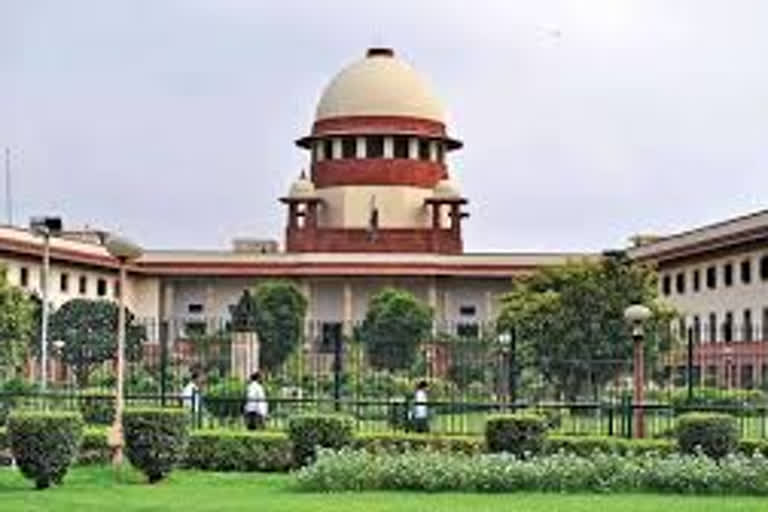New Delhi: The Supreme Court Wednesday said there is "no merit in charging interest on interest" for deferred loan payment installments during the moratorium period announced in wake of the COVID-19 pandemic.
A bench headed by Justice Ashok Bhushan observed that once moratorium is fixed then it should serve the desired purposes and the government should consider interfering in the matter as it cannot leave everything to banks.
"Once the moratorium is fixed then it should serve the desired purposes and we see no merit in charging interest on interest," the bench, also comprising Justices S K Kaul and Justice M R Shah, orally observed.
The bench was hearing a plea filed by an Agra resident Gajendra Sharma, who has sought a direction to declare the portion of the RBI''s March 27 notification "as ultra vires to the extent it charges interest on the loan amount during the moratorium period, which create hardship to the petitioner being borrower and creates hindrance and obstruction in ''right to life'' guaranteed by Article 21 of the Constitution of India".
Solicitor General Tushar Mehta, appearing for the Centre and the Reserve Bank of India, told the apex court that waiving the interest completely will not be easy for banks as they have to pay interest to their depositors.
"There are 133 lakh crore rupees in deposits with banks and interest has to be paid on them and the waiver will have a cascading effect," Mehta told the bench.
The bench, which posted the matter for hearing in first week of August for allowing the Centre and the RBI to review the situation, asked the Indian Banks Association to examine whether they can bring new guidelines in the meantime on the issue of loan moratorium.
Mehta argued that complete waiver of interest during moratorium period might risk the financial stability of banks and this would put the interests of depositors in jeopardy.
The counsel representing banks association and State Bank of India (SBI) urged the bench that the matter should be deferred by three months.
The counsel appearing for banks said that plea seeking waiver of interest during moratorium period is premature and the banks would have to consider the issue on a case to case basis.
On June 12, the top court had asked the Finance Ministry and the RBI to hold a meeting within three days to decide on waiver of interest on interest for deferred payments of instalments for loans during moratorium period.
The top court had observed that the question is not of waiver of complete interest for entire moratorium period but it is limited only to interest charged on interest by banks.
The petitioner has sought a direction to the government and the RBI to provide relief in repayment of loan by not charging interest during moratorium period.
On June 4, the top court had sought the Finance Ministry''s reply on waiver of interest on loans during the moratorium period after the RBI said it would not be prudent to go for a “forced waiver of interest” risking financial viability of the banks.
The apex court had said there are two aspects under consideration in this matter - no interest payment on loans during the moratorium period and no interest to be charged on interest.
It had observed that these are challenging times and it is a serious issue as on the one hand, moratorium is granted and on other hand, interest is charged on loans.
On May 26, the top court had asked the Centre and the RBI to respond to the plea challenging levy of interest on loans during the moratorium period.
The RBI in its reply has told the court that it is taking all possible measures to provide relief with regard to debt repayments on account of the fallout of COVID-19 but it does not consider it prudent to go for a “forced waiver of interest, risking the financial viability of the banks it is mandated to regulate, and putting the interests of the depositors in jeopardy”.
The RBI said the March 27 circular announcing moratorium was later modified on April 17 and May 23 by which the moratorium period was extended by another three months that is from June 1 to August 31, 2020 on payment of all installments in respect of term loans (including agricultural term loans, retail and crop loans).
"It is submitted that regulatory dispensations permitted by the Reserve Bank of India vide the aforesaid circulars dated March 27, 2020 which subsequently stood modified on April 17, 2020 and May 23, 2020 were with the objective of mitigating the burden of debt servicing brought about by disruptions on account of COVID-19 pandemic and to ensure the continuity of viable businesses.
"Therefore, the regulatory package is, in its essence, in the nature of a moratorium/deferment and cannot be construed to be a waiver," it said.
The RBI had said that in order to ameliorate difficulties faced by borrowers in repaying accumulated interest for the moratorium period, on May 23 it had announced that in respect of working capital facilities, lending institutions may, at their discretion, convert the accumulated interest for the deferment period up to August 31, 2020, into a funded interest term loan (FITL) which shall be repayable not later than March 31, 2021.
PTI Report
Also Read: HC directs Delhi govt to enhance Internet system in district courts within two weeks



